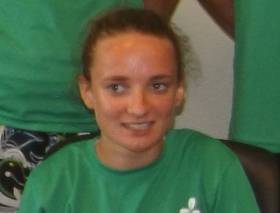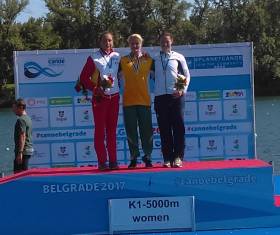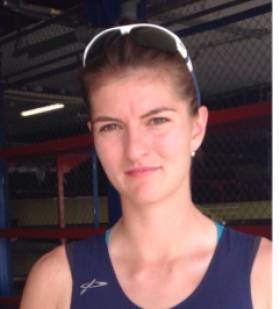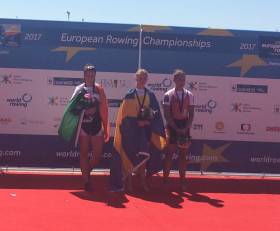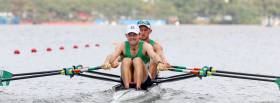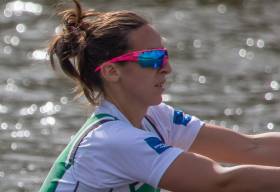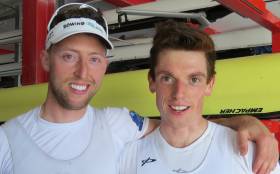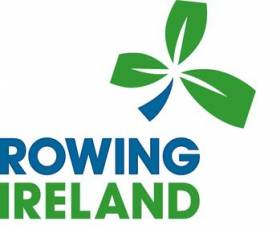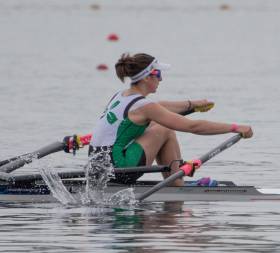Displaying items by tag: Ireland
#Rowing: Margaret Cremen and Aoife Casey have been chosen to represent Ireland at the World Junior Championships in August in Lithuania. The junior double, which took silver at the European Junior Rowing Championships in Germany last month, tops the list of selections for the big events for underage rowers.
Four crews have been chosen for the Coupe de la Jeunesse (one, the junior men’s double provisional on their performance at Cork Regatta). A big junior team has also been named for the Home Internationals, which will be held in Scotland in July.
| Junior Team Selections 2017 |
|---|
| The following junior teams have been selected to race at international regattas this coming summer. This list will be finalised after Cork Regatta. (Details can be found at the end of this document). |
| Junior World Championships (Trakai, Lithuania, August 2-6) |
| JW2x |
| Margaret Cremen (Lee Rowing Club) |
| Aoife Casey (Skibbereen RC) Coach: Dan Buckley (Lee RC) |
| (Eleanor Casey, Skibbereen RC will travel with the crew as chaperone). |
| Coupe de la Jeunesse (Hazewinkel, Belgium, July 29-30) |
| JM4x- |
| Barry O'Flynn (Cork BC) |
| Matt Dundon (Clonmel RC) |
| Jack Keating (Carlow RC) |
| James Quinlan (Castleconnell BC) Coach: Ray Morrison (Fermoy RC) |
| JM2x (Provisional based on performance at Cork Regatta) |
| Oisin Clune (Three Castles) |
| Rory Quinn (Three Castles) |
| JW2- |
| Ellie O' Reilly (Fermoy) |
| Gill McGirr (Fermoy) Coach: John Walsh (St Joseph's RC) |
| JM4- |
| Nathan Timoney (Enniskillen) |
| Barry Connolly (Cork BC) |
| Ross Corrigan (Enniskillen) |
| Aaron Johnston (Enniskillen) Coach: John Walsh (St Joseph's RC) |
| Home International (Strathclyde, Scotland, July 22) |
| Junior Women - Sweep Team (Full Team) JW 4+ |
| Siobhan Maxwell (Commercial) Aishling Keogh (Commercial) Mia Kovacs (Shandon) |
| Chelsey Minehane (Shandon) Cox: Vicky Hanlon (Cork BC) |
| JW4- |
| Mia Jane Elliot (Enniskillen) Zoe McCutcheon (Enniskillen) Caitlyn Fee (Enniskillen) Miriam Kelly (Enniskillen) |
| JW2- |
| Megan Tully (Shannon) |
| Megan Carmody (Shannon) |
| *The JW Eight will be a combination of the 4+ and the 4- |
| Junior Men - Sweep Team (One pair will be added after Cork Regatta) |
| Coach: Fran Keane (Presentation College RC) |
| Olly O' Toole (Commercial) Edward Meehan (Commercial) Michael Lynch (Commercial) Ewan Jarvis (Commercial) Tom McKeon (SMRC) |
| Dylan O' Byrne (SMRC) |
| Odhran Donaghy (Enniskillen) Cox: Rory Farragher (Enniskillen) |
| Coach: Stewart Davis (Lee RC) |
| Junior Women - Sculling Team (There will be two names added after Cork Regatta) |
| Cliodhna Nolan (Carlow RC) |
| Georgia O'Brien (Kenmare) |
| Ciara Browne (Workmans) |
| Anna O'Sullivan (Fermoy RC) |
| Ciara Moynihan (Workmans) Coach: TBC |
| Junior Men - Sculling Team (There may be two names added after Cork Regatta) |
| Aaron Christie (Bann) |
| Tadhg McKnight (Three Castles) Alex Byrne (Shandon BC) |
| Andy O'Toole (Carlow RC) |
| Ross O'Brien (Carlow RC) Coach: TBC |
| *All selections are subject to continued performance and a willingness to partake in organised squad sessions and training camps as deemed necessary. |
| CORK CITY REGATTA: |
| Any person who is not pre-selected on this document, and who wishes to be considered for the remaining Home International places on the Men's Sculling and Sweep teams and Women's sculling team, are asked to enter JUNIOR 18 A (Div.1) 1x or 2- at Cork City regatta (June 24/25). |
| The highest ranked 1x or 2- from the finals will be considered to fill these positions. If no boat makes final A, B or C then the fastest times from the heats will be used. (i.e. Grand league and trial format). |
| Coaches must email their athletes intention to race to [email protected] (Sweep) or to [email protected] (Sculling) by 14/06/2017 and also to submit their most recent 2k erg score. |
Jenny Egan Takes Bronze at World Cup in Serbia
#Canoeing: Ireland’s Jenny Egan took a bronze medal at the canoe sprint World Cup in Belgrade in Serbia today. Australia’s Alyssa Bull took the gold in the K1 5,000 metres from Laia Pelachs of Spain.
Egan (30) started her season with a win in the K1 5,000 at the first World Cup in Montemor-O-Velho in Portugal. She also competed in the second World Cup in Szeged in Hungary.
Canoe Sprint World Cup, Belgrade (Selected Results; Irish interest)
Women
K1 5,000 – Final: 1 Australia (A Bull) 22 minutes 26.080 seconds, 2 Spain (L Pelachs) 22:27.83, 3 Ireland (J Egan) 22:35.60.
#Rowing: Monika Dukarksa of Killorglin won the women’s Championships Single at Metropolitan Regatta at Dorney Lake today. Ronan Byrne finished third in the men’s Championship singles final and teamed up with Dan Begley to take second in the men’s Championship Doubles. Myles Taylor of Queen’s took second in the lightweight single.
Cork finished second in the women’s Championship Pairs and the Ireland men’s lightweight quadruple were third in the Championship Quadruple.
In the men's Championship Coxed Four, NUIG placed second and Trinity third.
#Rowing: Ireland made a brilliant start to the final day of the European Rowing Championships.
Mark O’Donovan and Shane O’Driscoll dominated the men’s lightweight pair to take gold and, immediately afterwards, Denise Walsh took a gutsy silver medal in the lightweight single sculls.
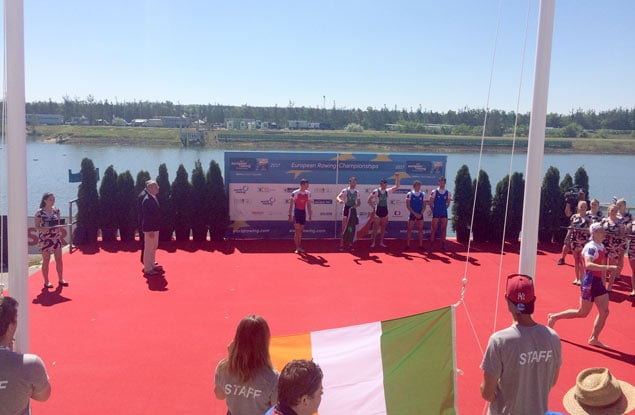 Mark O'Donovan and Shane O'Driscoll medal ceremony
Mark O'Donovan and Shane O'Driscoll medal ceremony
European Rowing Championships, Day Three (Selected Results; Irish interest)
Men
Lightweight Pair – A Final:
1 Ireland (M O’Donovan, S O’Driscoll) 6:32.34, 2 Russia 6:34.74, 3 Italy 6:34.89; 4 Britain (J Cassells, S Scrimgeour) 6:39.75.
Women
Lightweight Single Sculls – A Final: 1 Sweden (E Fred) 7:36.24, 2 Ireland (D Walsh) 7:38.00, 3 Switzerland (P Merz) 7:39.94.
O'Donovans Back on Track And Into European Final
#Rowing: Ireland’s Paul O’Donovan and Gary O’Donovan took an excellent second place behind Olympic champions France to secure their place in the A Final of the lightweight double sculls at the European Rowing Championships in Racice today. France were outstanding throughout the 2,000 metres and won by a length. Ireland were sixth at 500 metres, but began to move up the field in the second quarter. They moved through Greece and Germany before the end and saw off a challenge by the Germans coming up to the line – by eight hundredths of a second.
Italy won the second semi-final from Britain and Poland – but in a much slower time.
European Rowing Championships, Day Two (Selected Results; Irish interest)
Men
Lightweight Double Sculls – Semi-Final One: 1 France (P Houin, J Azou) 6:35.68, 2 Ireland (G O’Donovan, P O’Donovan) 6:38.09, 3 Germany (L Schaefer, J Osborne) 6:38.17; 4 Czech Republic 6:41.86, 5 Greece 6:49.59, 6 Spain 7:02.70.
Semi-Fnal Two: 1 Italy 6:43.71, 2 Britain (P Chambers, W Fletcher) 6:45.29, 3 Poland 6:46.49.
Women
Lightweight Single Sculls – Semi-Final One: Switzerland (P Merz) 7:39.48, 2 Ireland (D Walsh) 7:42.53, 3 Italy (C Guerra) 7:43.99.
Semi-Final Two:
1 Sweden (E Fred) 7:36.74, 2 Russia (A Lebedeva) 7:37.90, 3 Germany (L Pieper) 7:42.46.
Denise Walsh Secures A Final Spot at European Rowing
#Rowing: Denise Walsh qualified for the A Final of the lightweight single sculls by finishing second in her semi-final at the European Rowing Championships in Racice today. The race was won, with a dominant peformance, by Patricia Merz of Switzerland. She started well, built a clearwater lead by halfway and showed no weakness as Walsh tried to reel her in in. Italy’s Clara Guerra took third place and the other A Final spot.
In the second semi-final, Sweden’s Emma Fred won in a slightly better time than Merz’s, but she was pushed by Anastasia Lebedeva of Russia and Germany’s Leonie Pieper, who took the remaining A Final slots.
European Rowing Championships, Day Two (Selected Results; Irish interest)
Women
Lightweight Single Sculls – Semi-Final One: Switzerland (P Merz) 7:39.48, 2 Ireland (D Walsh) 7:42.53, 3 Italy (C Guerra) 7:43.99.
Semi-Final Two:
1 Sweden (E Fred) 7:36.74, 2 Russia (A Lebedeva) 7:37.90, 3 Germany (L Pieper) 7:42.46.
O'Driscoll and O'Donovan Give Classy Display
#Rowing: Mark O’Donovan and Shane O’Driscoll took advantage of the good conditions on the beautiful course to win their exhibition race in the men’s lightweight pair at the European Rowing Championships in Racice. The race counts in the allocation of lanes in the final, and Britain, represented by Joel Cassells and Sam Scrimgeour, and Ireland shot it out the last time this happened, at the World Cup in Belgrade. However, this time Ireland were in command from halfway, tested only by Italy, who finished second.
European Championships, Racice, Czech Republic, Day One (Selected Results; Irish interest)
Men
Lightweight Pair – Exhibition (Race for Lanes): 1 Ireland (M O’Donovan, S O’Driscoll) 6:57.77, 2 Italy 6:59.82, 3 Russia 7:01.75, 4 Britain (J Cassells, S Scrimgeour) 7:03.39.
Lightweight Double Sculls – Heats (Winner to A/B Semi-Finals; rest to Repechages) – Heat One: 1 France (P Houin, J Azou) 6:26.97. Heat Two: Germany (L Schaefer, J Osborne) 6:37.53.
Heat Three: 1 Poland 6:25.93, 2 Ireland (G O’Donovan, P O’Donovan) 6:32.15, 3 Russia 6:36.38, 4 Switzerland 6:40.60, 5 Austria. Heat Four: 1 Italy 6:30.77.
Women
Lightweight Single Sculls – Heat One (First Three to Semi-Finals; rest to Repechage): 1 Ireland (D Walsh) 7:44.85, 2 Denmark (A Runge Holmegaard) 7:49.49, 3 Poland (J Dorociak) 7:49.90; 4 Czech Republic 8:05.07, 5 Portugal 8:08.19. Heat Two: 1 Switzerland 7:42.510. Heat Three: 1 Sweden 7:39.52.
#Rowing: The new High Performance Director for Irish rowing will be Antonio Maurogiovanni. The Italian will take up the role in August.
Maurogiovanni rowed for Italy at the 1988 Seoul and 1992 Barcelona Olympic Games in the four and eight respectively.
As a coach he was involved in seven Olympic Games with several nations including Italy, the Netherlands, and Australia. He moves on from his role with Rowing Australia as Head Coach with the Western Australian team after 15 years. He said he was excited to take up the new challenge.
He said rowing has been his passion and made up much of his life. “It has taken me from Italy to Australia to the Netherlands and back to Australia and now to Ireland. I look forward to applying the experience and knowledge I have acquired over the years and using it to the best of my ability to bring success in Ireland.”
Hamish Adams, the chief executive of Rowing Ireland, said: “We have been through an extremely robust and intensive recruitment process to source the best possible candidate for this demanding role. As a professional coach with a background in sport science and vast Olympic experience Antonio is an exceptional candidate and we are delighted to welcome him to our team.
“I wish to thank Neville Maxwell, Chair of our High Performance Committee, Paul McDermott, Sport Ireland High Performance Director and Gianni Postiglione, World Rowing (FISA) coaching representative for their personal contributions to this recruitment process."
#Rowing: The Ireland lightweight double of Paul and Gary O’Donovan finished second in their heat at the European Rowing Championships in Racice in the Czech Republic today. Only the winner of each of the four heats qualified directly for the A/B semi-finals. Russia dominated early on, but the second half of the race belonged to Poland. As Russia faded, they opened a lead of over three seconds over Ireland, and despite a charge by the men in green they never looked other than winners.
France, Germany and Italy won their heats well.
European Championships, Racice, Czech Republic, Day One (Selected Results; Irish interest)
Men
Lightweight Double Sculls – Heats (Winner to A/B Semi-Finals; rest to Repechages) – Heat One: 1 France (P Houin, J Azou) 6:26.97. Heat Two: Germany (L Schaefer, J Osborne) 6:37.53.
Heat Three: 1 Poland 6:25.93, 2 Ireland (G O’Donovan, P O’Donovan) 6:32.15, 3 Russia 6:36.38, 4 Switzerland 6:40.60, 5 Austria. Heat Four: 1 Italy 6:30.77.
Women
Lightweight Single Sculls – Heat One (First Three to Semi-Finals; rest to Repechage): 1 Ireland (D Walsh) 7:44.85, 2 Denmark (A Runge Holmegaard) 7:49.49, 3 Poland (J Dorociak) 7:49.90; 4 Czech Republic 8:05.07, 5 Portugal 8:08.19. Heat Two: 1 Switzerland 7:42.510. Heat Three: 1 Sweden 7:39.52.
Walsh Wins European Heat in Impressive Fashion
#Rowing: Denise Walsh put in an impressive performance to win her heat of the lightweight single sculls at the European Rowing Championships in Racice in the Czech Republic. The bright sunshine had abated, but the Skibbereen woman took full advantage of the duller, tailwind conditions. She took a strong lead in the second half and was never truly tested from there. The small Ireland crowd cheered her over the line.
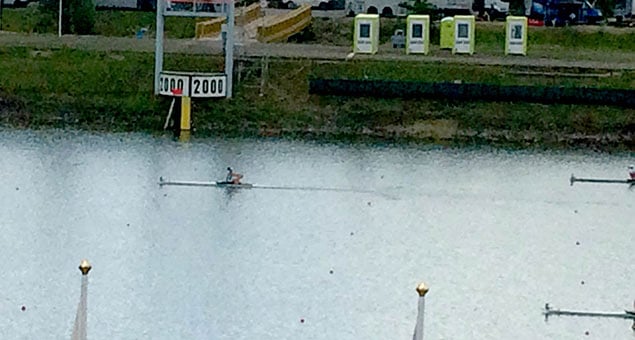 Denise Walsh crosses the line first in Racice this morning
Denise Walsh crosses the line first in Racice this morning
European Championships, Racice, Czech Republic, Day One (Selected Results; Irish interest)
Women
Lightweight Single Sculls – Heat One (First Three to Semi-Finals; rest to Repechage): 1 Ireland (D Walsh) 7:44.85, 2 Denmark 7:49.49, 3 Poland 7:49.90; 4 Czech Republic 8:05.07, 5 Portugal 8:08.19.


























